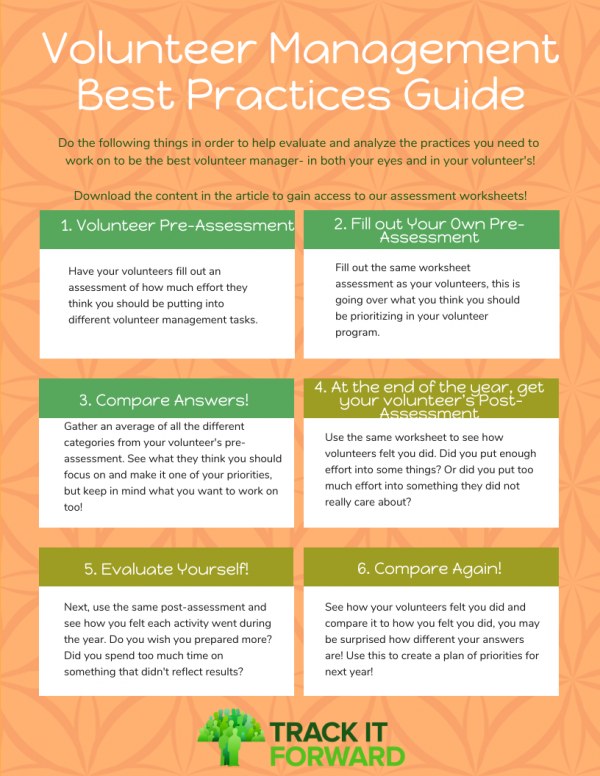I’ve volunteered all my life, with the Humane Society, SPCA, Habitat for Humanity, Boys & Girls Club, you name it! I’ve also had many different coordinators and have my own personal thoughts about their leadership and the way they run the organization. However, I didn’t realize how difficult it really was to be a volunteer coordinator, until I became one myself. All of a sudden, I couldn’t get volunteers to track hours, to sign up for events, to communicate with me if they couldn’t make it to an event, and that was just the beginning of it.
It was easy to find articles on the web about how to effectively manage volunteers. However, it’s something that not everyone would find easy to do. Managing volunteers is a hard job, yet rewarding. Volunteers are the backbone of your organization, so to keep them coming back, your management strategy and style are just as important to them, as the work they do.
We are not just talking about the four R’s: Recruitment, Retention, Recognition & Resources. Yes, they are critical in this role, however, the way you treat the volunteers, the way you talk to them, and in general, the focus you put on your volunteers is so much more important than you’ve ever thought! So when it comes to volunteer management best practices, this goes deeper than just maintaining those four R’s.
One of the most important and best practices for volunteer management is self-assessment! Constantly reflect on your volunteer program and volunteer management performance to truly create the best volunteer program!
We’ve created a self-assessment sheet that can help you see what practices of volunteer management you may need to focus on more. We will elaborate on the volunteer management best practices below, but you can download the worksheets now if you want!

The best way to identify the best practices for volunteer management in your volunteer program is to do a bit of good old pre-assessment and post-assessment. At the beginning of each year of your volunteer program, one of the best practices is to do a pre-assessment. Gather the following information: what your volunteer’s expectations of the volunteer manager are and what your expectations are for your volunteer management practices. Then, compare the two to evaluate a common ground of what you should be focusing on. These will become your volunteer management practices to focus on throughout the year.
You can use our worksheet that we have created here for both the pre-assessment of volunteer management best practices and the post-assessment.
Then, after you work hard on the specific practices you gathered from the pre-assessment, you do the same thing for the end of the year. Use the same worksheet or form and have your volunteers fill out how well you met their expectations, then analyze how well you think you did on the specific practices, and then gather results of what you can work on in the future!
One of the biggest challenges in being a volunteer manager is identifying what your strengths and weaknesses are. Using a method like this one will help you identify your strengths, weaknesses, and what your volunteers think are the best practices for being a volunteer manager!
Volunteer Management Best Practices To Evaluate
Here are some of the best practices we have put on the evaluation worksheet to help you understand the possible things your volunteers can expect from you and what you can work on! We have broken down volunteer management best practices into the categories of onboarding, communication, volunteer recognition, and organizational setup to help place volunteer management efforts into different categories.
Volunteer Management Best Practices in Onboarding
Volunteer Orientation - some volunteers really see the value in an orientation!
Volunteer Training - if training is inadequate, volunteers may feel overwhelmed and underprepared.
Introductions of Volunteers To Staff / Other Volunteers - a lot of volunteers like to feel like volunteering is a social event and make friends! See if your volunteers are interested in this aspect.
Periodic Check-ins With Volunteers - volunteers may feel overwhelmed sometimes, having check-ins will allow them to feel connected and allow your volunteer program to help them relieve their stress. Part of being the best volunteer manager is providing a service that your volunteers may need!
Volunteer Management Best Practices In Communication
A clear outlet for sharing news and communicating with volunteers - make sure volunteers know where to look to expect communication from you.
Facilitate easy communication between volunteers - you may need to help initiate social interaction between volunteers, this is a great opportunity to build relationships and retain these volunteers.
The response rate to questions and concerns - your response rate and overall reachability can be really important to some volunteers.
Holding meetings regularly and when necessary - meetings are touch and go with many volunteers. Some dislike them a lot, others prefer to meet in person. Some of the best practices for volunteer management differ from program to program.
Volunteer Management Best Practices in Volunteer Recognition
Events to show volunteer appreciation - volunteers need to feel appreciated in order to keep volunteering. Have you done anything to show your appreciation?
Volunteer Time Tracking system in place - a lot of volunteers like to know how many hours they have put in, some even maybe doing it for a requirement! P.s. a volunteer time tracking system can save you lots of time as well!
No favoritism - volunteers pick up on favoritism quickly and it can be a fault in your program without you realizing it.
An easy person to talk to about conflict - there will be conflict in your job and you need to be able to deal with it! See how your volunteers feel you do with a conflict with these assessments.
Volunteer Management Best Practices In Organizational Setup
Leadership opportunities are available - volunteers like to take on challenges!
Volunteer Roles & Responsibilities are defined - these are extremely important to keep volunteers around and to create volunteer tasks that volunteers feel prepared and trained in.
Volunteers know how to handle any issues that may arise - if you work in an area of conflict or sensitive situations, volunteers need to know how to handle these issues.
Volunteers can easily figure out how much time and effort they have put into the organization - this goes with time tracking. Volunteers should be able to easily see their efforts into the organization.
New volunteer opportunities are created and ideas of new volunteer programs are appreciated - some volunteers may want to suggest ideas and changes, is your volunteer management program excepting of this?
Volunteer work is manageable - you do not want volunteers to feel like they don’t have enough opportunities to volunteer, or are given way too many. One of the best volunteer management practices is creating a great volunteer balance.
Volunteers see their impact within the organization - again, another retention tactic. Volunteers want to feel helpful!
Using our pre-assessment and post-assessment worksheets, you will be able to find the volunteer management practices that are important to your volunteers and prioritize them. Then, hopefully, you will have your priorities organized and happy volunteers!
Remember, volunteer management is a job with many responsibilities and many priorities. It is okay to prioritize and focus on one task at a time, or all tasks together. Just don’t bite off more than you can chew, and know that there is always going to be room for improvement!
 Last updated by
Last updated by